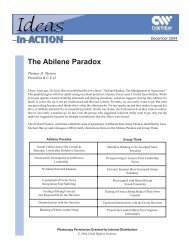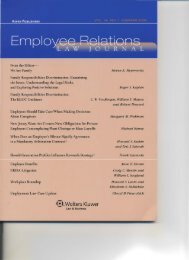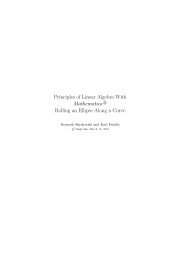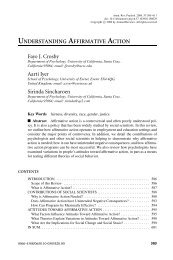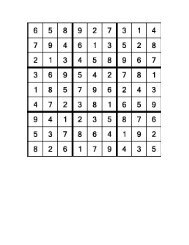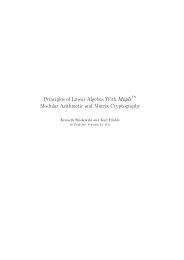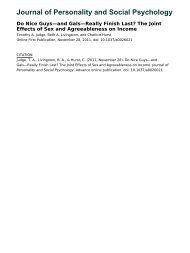www.SE.edu 1-800-435-1327 - Southeastern Oklahoma State ...
www.SE.edu 1-800-435-1327 - Southeastern Oklahoma State ...
www.SE.edu 1-800-435-1327 - Southeastern Oklahoma State ...
Create successful ePaper yourself
Turn your PDF publications into a flip-book with our unique Google optimized e-Paper software.
178 <strong>Southeastern</strong> <strong>Oklahoma</strong> <strong>State</strong> University<br />
CIS 4223 DECISION SUPPORT SYSTEMS An overview of<br />
the field of Artificial Intelligence including theories of intelligence,<br />
knowledge representation, problem-solving, and heuristics. Provides<br />
practical experience in the development of Expert Systems. (Prerequisite:<br />
STAT2153 and one programming language)<br />
CIS 4343 APPLIED NET-CENTRIC COMPUTING This course<br />
focuses on integrating the class knowledge in computer science and<br />
internet technology together and applying those skills in local/wide area<br />
networks and virtual private network. Topics include: web technologies,<br />
network architecture, protocols, applications, management, and<br />
security. In addition, the network hands-on projects for students will<br />
include: configuring network services/servers such as DNS, DHCP,<br />
NATP, Firewall, TELNET, FTP, SSH, Email, Newsgroup, Database,<br />
and Web Servers, implementing the Network File System and Network<br />
Information System, sharing resources between Unix/Linux and Windows<br />
network systems and developing a Three-tier Database-driven<br />
on-line E-Commerce application. (Prerequisite CIS 3223)<br />
CIS 4413 SYSTEMS ANALYSIS Producing quality software<br />
on time and under budget that meets all user requirements through<br />
the software life cycle techniques. Cost estimation, project management,<br />
testing, and maintenance are stressed. (Prerequisite: 90 hours<br />
towards baccalaureate degree) (Same as CS 4413)<br />
CIS 4423 SOFTWARE ENGINEERING Practical application of<br />
systems software development using techniques learned in previous<br />
courses. Should be taken toward the end of a student’s academic<br />
training. (Prerequisite: CIS 4413) (Same as CS 4423)<br />
CIS 4613 HEALTH INFORMATION SYSTEMS An introduction<br />
to the fundamentals of health information management using computer-based<br />
patient records. Key areas of study within health information<br />
management are addressed, with emphasis on the use of information<br />
as an asset to the health care provider. Included topics illustrate the<br />
importance of planning and setting proc<strong>edu</strong>res for proper storage,<br />
maintenance, usage, and security of health information records.<br />
CIS 4960 DIRECTED READING (Prerequisite: permission of<br />
the department)<br />
CIS 4970 SPECIAL STUDIES (Prerequisite: permission of the<br />
department)<br />
CIS 4980 <strong>SE</strong>MINAR (Prerequisite: permission of the department)<br />
CIS 5103 COMPUTER ETHICS An overview of the ethical use<br />
of computer systems and data for the professional. Topics covered<br />
will include privacy, property rights, accountability and Internet issues<br />
as well as codes of ethics and professional conduct as published by<br />
technical organizations.<br />
CIS 5113 DATA COMMUNICATIONS TECHNOLOGY This<br />
course covers principles of signal theory, communications protocols,<br />
current software designs, topology and how wireless and other new<br />
technologies such as usage of Bluetooth, highly elliptical-orbiting satellites<br />
and code multiplexing are changing the industry’s adaptation of<br />
available technologies. Leading edge communications trends will be<br />
addressed, especially those pertaining to internet applications using<br />
wire, radio, light and other electromagnetic methods. New developments<br />
unknown at the time of this publication will be injected into the<br />
subject matter. (Prerequisite: departmental approval)<br />
CIS 5343 APPLIED NET CENTRIC COMPUTING This course<br />
focuses on integrating the class knowledge in computer science and<br />
internet technology together and applying those skills in local/wide area<br />
networks and virtual private network. Topics include: web technologies,<br />
network architecture, protocols, applications, management, and<br />
security. In addition, the network hands-on projects for students will<br />
include: configuring network services/servers such as DNS, DHCP,<br />
NATP, Firewall, TELNET, FTP, SSH, Email, Newsgroup, Database,<br />
and Web Servers, implementing the Network File System and Network<br />
Information System, sharing resources between Unix/Linux and Windows<br />
network systems and developing a Three-tier Database-driven<br />
on-line E-Commerce application. (Prerequisite CIS 3223)<br />
CIS 5960 DIRECTED READINGS Individualized literature<br />
study selected in consultation with the student’s graduate advisory<br />
committee. (Prerequisite: department approval)<br />
CIS 5970 SPECIAL STUDIES Individualized project selected<br />
with the advice of the student’s graduate advisory committee. (Prerequisite:<br />
department approval)<br />
CIS 5980 <strong>SE</strong>MINAR Small group study of topic announced by<br />
department (Prerequisite: department approval)<br />
CIS 5990 RE<strong>SE</strong>ARCH FOR MASTER’S THESIS Independent<br />
investigation designed in consultation with the student’s graduate<br />
advisory committee. (Prerequisite: department approval)<br />
COMPUTER SCIENCE (CS)<br />
CS 1113 #COMPUTER LITERACY A study of the basic computer<br />
operations, the role of computers in society, and some applications<br />
in business, industry, and <strong>edu</strong>cation. (Does not count toward the<br />
Computer Science major or minor.)<br />
CS 1213 #BASIC COMPUTER PROGRAMMING Conditional<br />
transfers, reading, printing, loops, lists, tables, functions, subroutines,<br />
strings, conversational programming.<br />
CS 1313 #LOGIC AND PROBLEM-SOLVING This course is<br />
the study of sound reasoning and the application of this reasoning<br />
to problem-solving. In the course we will discuss many approaches<br />
to problem-solving such as step algorithms, flow charts, set theory,<br />
truth tables and Warnier programs. Students will learn techniques to<br />
translate real life problems into forms which will enable computer programs<br />
to solve them. These techniques or tools should allow students<br />
to create and design programs that will be dependable and correct.<br />
CS 1513 #PASCAL PROGRAMMING Problem-solving, programming<br />
style and documentation, block structured programming,<br />
subprograms, user defined data types. (Prerequisite: CS 1313 or<br />
equivalent)<br />
CS 1523 #ADVANCED PASCAL PROGRAMMING Elementary<br />
data structures (linked lists, stacks, queues, binary trees); recursion<br />
theory; algorithms (sorting and searching). (Prerequisite: CS 1513)<br />
CS 1613 #COMPUTER SCIENCE I Introduction to computer<br />
programming. The entire process of creating software is examined<br />
from analysis and design to coding and testing. An emphasis is placed<br />
upon problem-solving using top-down and bottom-up techniques.<br />
Language features include data types, functions, program flow control,<br />
and input/output.<br />
CS 1623 #COMPUTER SCIENCE II Objects and classes are<br />
introduced in an examination of inheritance and polymorphism. Project<br />
management techniques including make files and debugging tools are<br />
discussed. Language features explored include dynamic memory man-



